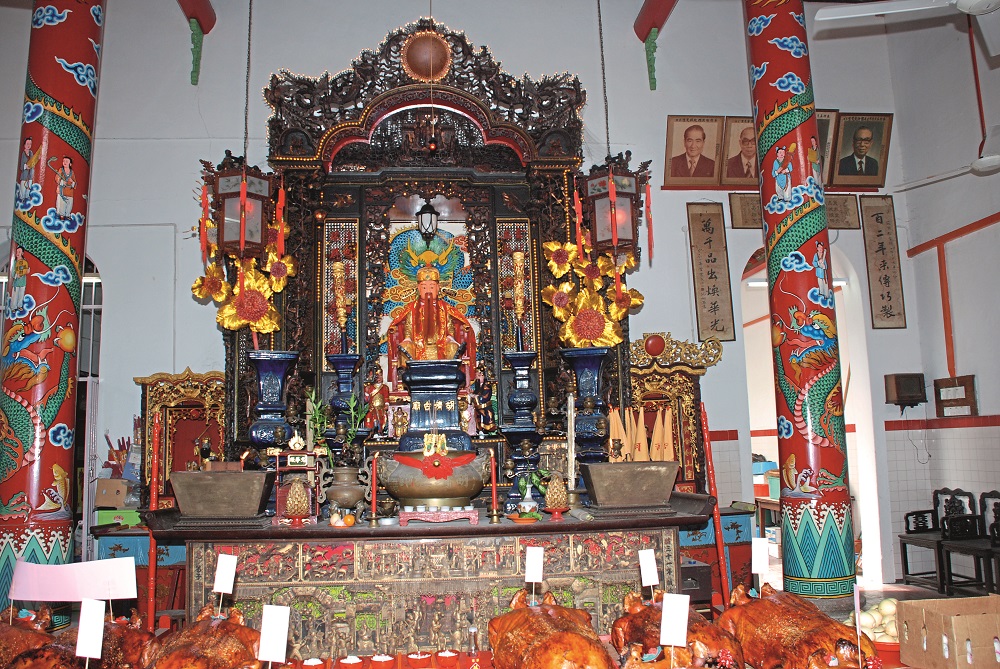Though tropical Bali is frequently touted as the island of the gods, Ronni Pinsler shares his delight in the vibrant deities of Penang who are to be found in every corner of the island and whose rich and poetic legends are still celebrated today.
Penang well deserves its sobriquet of “the island of the Gods”. Many Penangites continue to honour the various deities in the temples that were so liberally scattered all over the island by previous generations.
When you start to appreciate the some of the background stories, the god statues and the paintings really come to life.With a little curiosity and a modicum of further research it’s possible to find a legend, a myth, or even a historical event associated with every square foot of the land.
Even historical events and myths appear to blend seamlessly into each other. For example, the great Ming admiral, Zeng He, reputedly made at least one visit to Penang on his seven different voyages of exploration to South-East Asia, India, and East Africa. In Batu Maung on the South coast, his giant footprint is recorded at the Sam Po Kong temple, which stands where he is supposed to have landed.
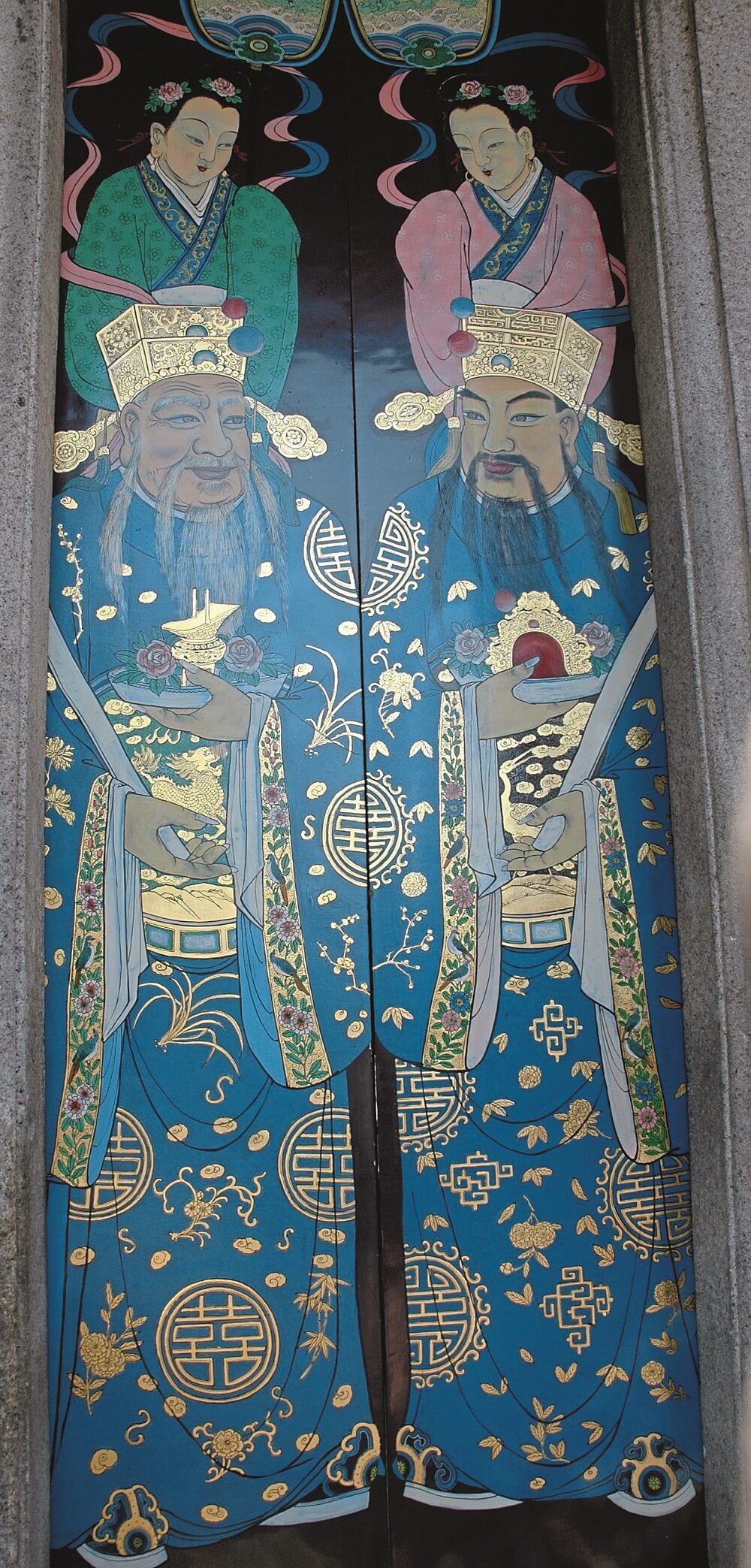
A good place to start is Weld Quay where the clan jetties offer an insight into the traditional life of the island’s Chinese population.
Try to visit the small unassuming shrine at the Chew Jetty Kopi Tiam (coffee shop). It’s dedicated to two goddesses, one of whom was Nu Wa.
The vast majority who occasionally light joss there perhaps do not realise that Nu Wa was the progenitor of the Chinese race and moulded them from yellow clay.
She is one of the oldest deities and was present at the creation of our planet, and saving it from natural disaster. She married her brother, Fu Xi, one of the three original sovereigns. She had the wisdom of a sage and her body had the shape of a snake with a human head.
However, as a goddess she could shape shift, and it’s said that a painting of her in her human form, hanging on a temple wall, that so entranced Emperor Chou that he attached a lewd poem it.
She felt offended by this attention and, in revenge, so the legend goes, she brought down the mighty Shang dynasty, the first rulers of China. Certainly not a goddess to disrespect!
Standing next to Nu Wa on the same altar is the mother and ruler of all the goddesses, Hsi Wang Mu. Her magic orchard of three thousand year old peach trees and were being saved for a celestial dinner party as the fruit conferred immortality on all those who ate it.
The irrepressible Monkey God, SunWo Kong, broke into it and greedily gobbled up all the peaches. The heavenly wrath was huge but unfortunately he couldn’t be killed because he was now immortal.
Quite a problem. But Guan Yin, the Goddess of Mercy, was able to subdue him. Wisely, she gave him a task, which was to escort Pigsy, Sandy, and the monk Xuanzang on their travels to collect the ancient scriptures from India. Along the way, the quartet had many adventures, which are described in “The Journey to the West”.
Jelutong, not often visited by tourists, is another area that is rich in deities. The goddess Tien Hou (sometimes known as Ma Tzu) presides in a country lane opposite the post office in Jalan Madrasah. Worshipped by sailors and seafarers, she is said to have had a dream about her father and brothers being in a storm at sea.
She was able to save them from drowning with her supernatural powers and has been worshipped ever since. Tien Hou is linked to another god, a healer who has his temple nearby also in Jelutong, He is Bao Sheng Da Di (Lord Bao) who looks very grand his courtly robes and crown, depicting the appreciation and patronage of royalty.
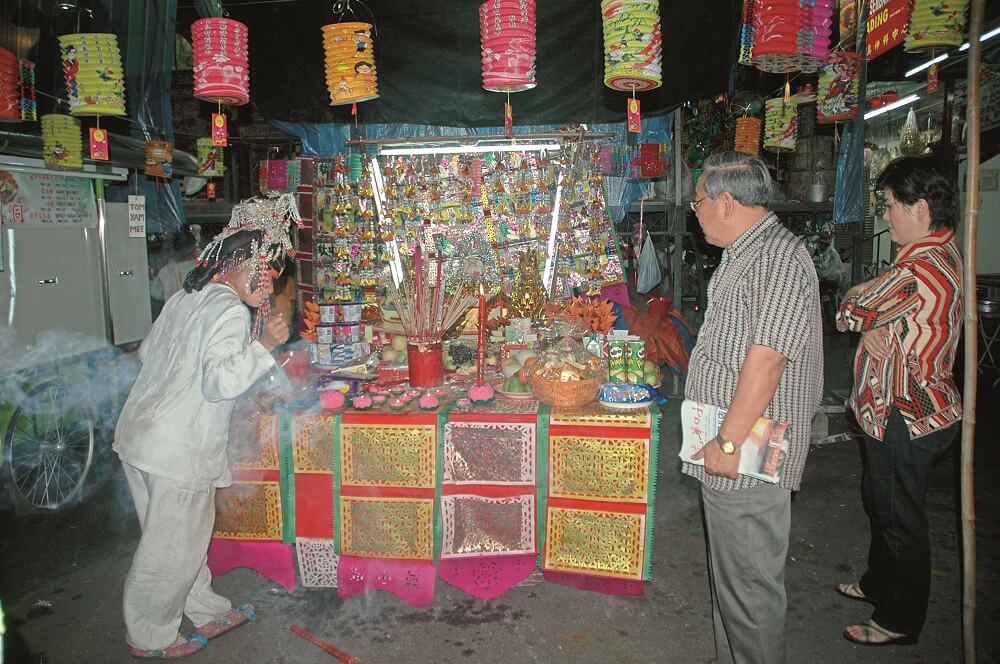
There is a legend that as gods that Tien Hou and Bao Sheng were to be married, but did not work out. It is thought that both bear malice to each other, so on his birthday she sends strong winds to blow his hat off. In return, he causes rain to fall on her birthday to get her make-up ruined.
Both these deities have old temples, within walking distance of each other and both are part of the rich traditions of Chinese immigration to Malaya. A statue of Tien Hou, as Goddess of the Sea, was almost certainly carried by each group of travellers making the arduous journey to Singapore, Melaka, Penang, and all the other migrant ports. She has grand temples in Pitt Street and her main “Headquarters” is found in Muntri Street.
During the time of the August full moon you can observe a very special ceremony in Perak Road, where a group of devotees pay homage to the Moon Goddess called Chang E. She was the wife of legendary archer hero Hou-Yi who shot down nine of the ten suns that were scorching the earth of those days. He left just one sun to provide light and sustenance. As a reward, Hou-Yi was given a pill of immortality. Unfortunately he hid it instead of immediately swallowing, not realising that his wife was watching.
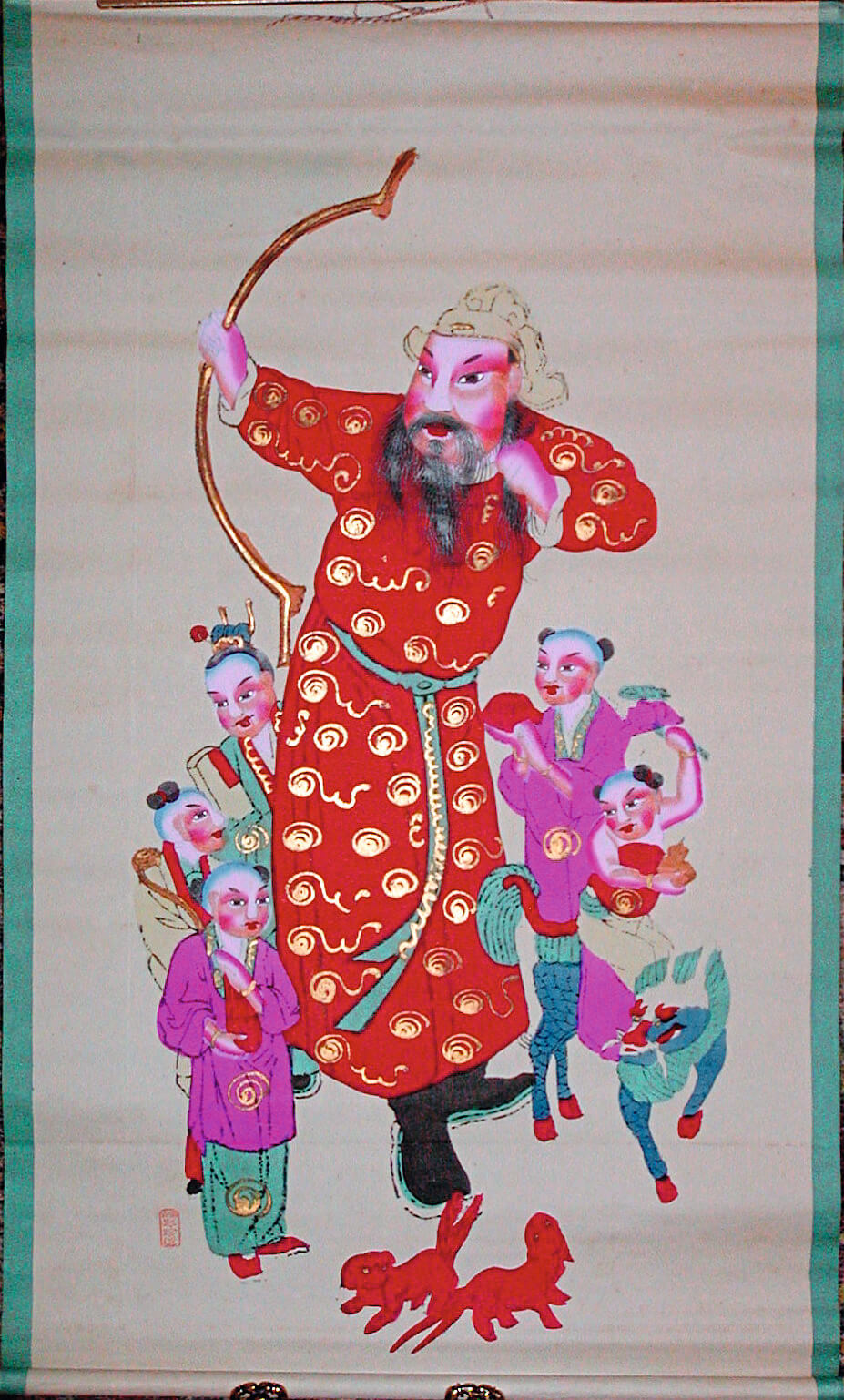
Chang E stole the pill and swallowed it and thus became an immortal. Her husband chased her and she fled to the moon. Despite all this he still loved her and missed her and so provided an altar and offerings to her, and devotees still do this in her memory.
A few years back, I observed the members of an opera troupe setting up a simple altar with fruits and cakes and simple decoration.
It was humble but done with so much love and devotion to the goddess. The actresses of the opera troupe hoped the goddess would help them stay healthy and beautiful.
Another goddess who is visited by not only actresses but also courtesans and ladies of the night is Hua Kor Neo.
Her statue is to be found in a temple along King Street in George Town. On a certain day in October she is remembered by a small group of followers who provide her with perfume, face towels, and make-up, including powder, lipstick, and other such requisites.
Hua Kor Neo keeps them attractive to men, so they will continue to love and care for their mistresses.
Around the corner from Love Lane, Muntri Street is an area that is rich with gods and history. Look for the Shaolin School, which teaches martial arts as well as providing traditional Chinese medicine. Ta Moh, the God of Martial Arts, is worshipped as a simple star at one end of the training room. Students will bow to him on commencing their exercises and before leaving.
Next door is a medical hall where numerous portraits of ancient China doctors and physicians are displayed, including with the God of Herbal Medicine, Shen Nung. You may notice that one of the doctors is depicted with a blackened face – this is because of the amount of poison he has consumed in his medical experiments.
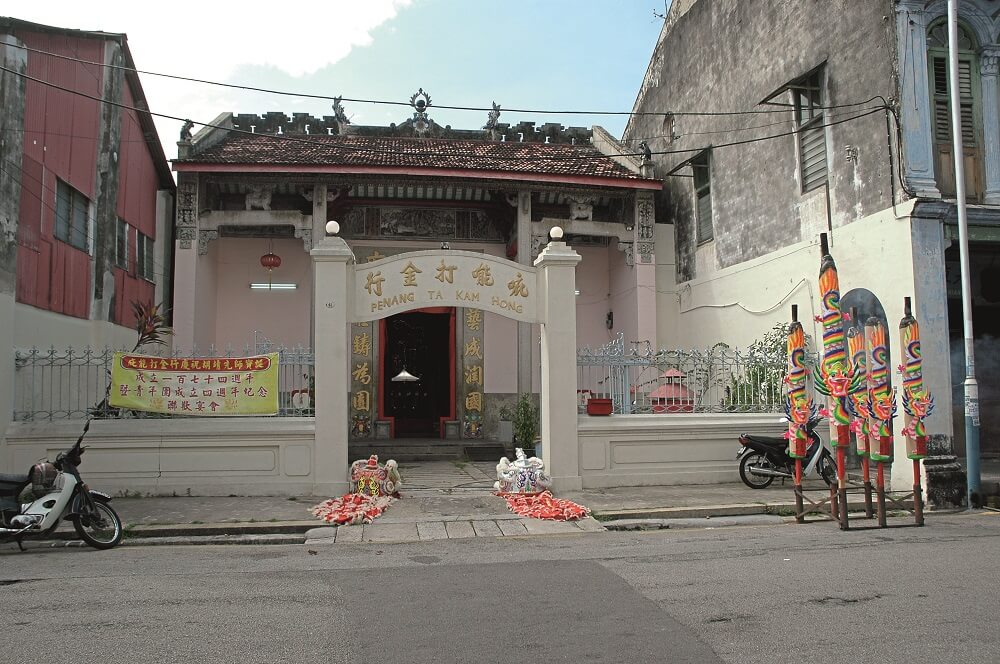
Six or seven houses further along the same street we come across another Guild house, Ta Kam Hong, or the Goldsmith’s Association, which was founded in 1832, making it the oldest surviving guild house left in the country. Every year in December the members congregate to pay respects to their patron god Wu Ching.
He made a particularly fine crown for a concubine who had aspirations to be empress. The headdress successfully hid a small blemish on her face. But it didn’t end well for the craftsman as the emperor married the concubine and discovered the ruse to hide the blemish. He had poor Wu Ching executed.
Going into many of Penang’s temples you will probably notice the fierce-looking figures that stand at the entrance. The story goes that an emperor had bad dreams at night, and so ordered his severest generals to guard the entrance to his bedchamber to keep the nightmares and the demons out.
The generals soon got tired, and couldn’t perform their military duties by day, so the Emperor had portraits made of them, which he posted at the door to his bedchambers. Naturally this custom filtered down to the common folk and so today at Chinese temple doorways you can still see the effigies of the loyal generals depicted in their role as Door Gods.
I have been able to describe only a few of the tens of thousands of similar stories abounding in Chinese tradition. Just keep your eyes open at any street corner where offerings have been made, candles lit, fruit and flowers offered, or where flags flutter or where you catch whiff of incense – all which will tell you that a god has been propitiated. These celestial spirits are all intertwined with daily life.
They are amongst us always, and it doesn’t require a third eye to see them. Not in the island of the gods.
This article was originally published in The Expat magazine (December 2016), which is available online or in print via a free subscription.
"ExpatGo welcomes and encourages comments, input, and divergent opinions. However, we kindly request that you use suitable language in your comments, and refrain from any sort of personal attack, hate speech, or disparaging rhetoric. Comments not in line with this are subject to removal from the site. "


